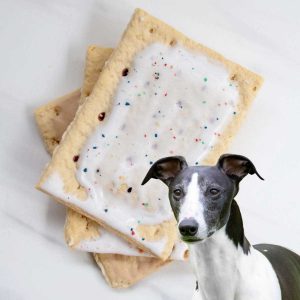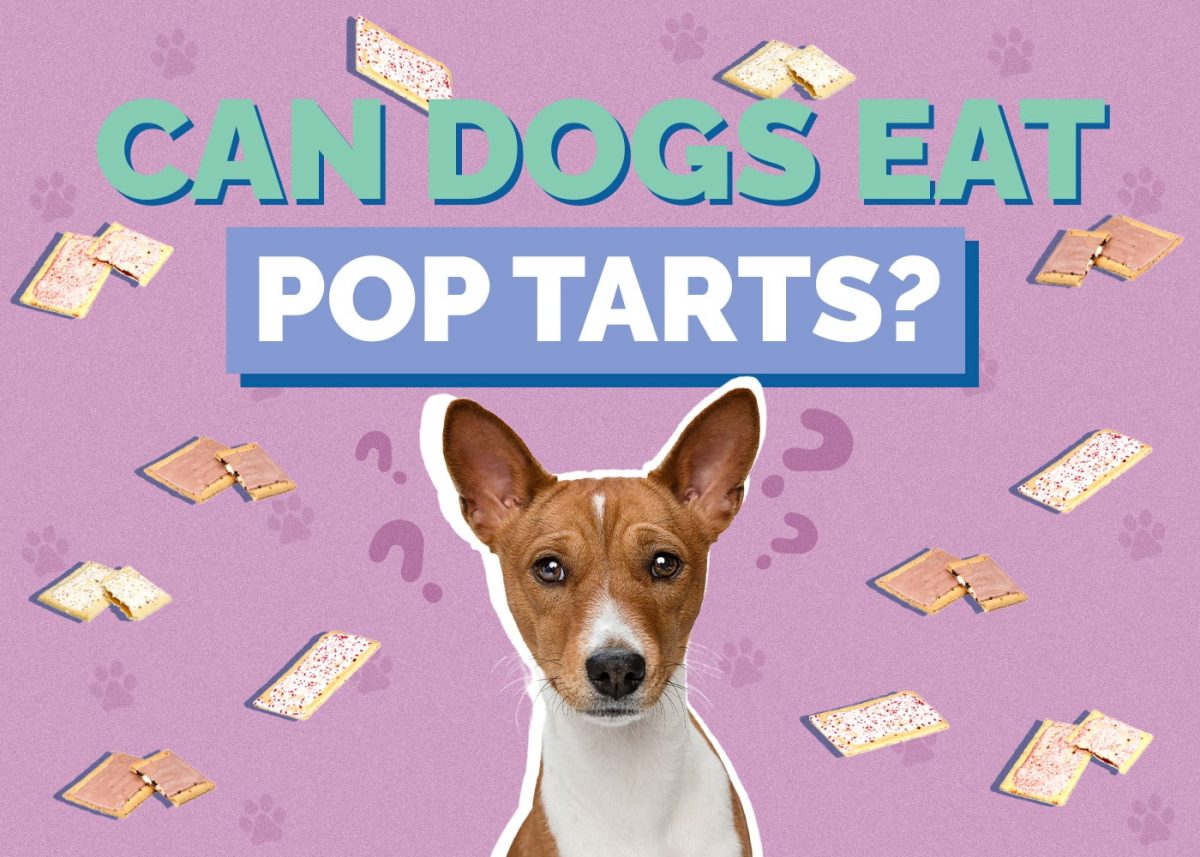Pop Tarts are a popular type of toaster pastry known for their convenience and wide range of flavors. These pastries consist of a thin, rectangular crust filled with various sweet fillings, often topped with icing or sprinkles. They are typically consumed as a quick breakfast or snack option.
Description of Pop Tarts and Their Ingredients
Pop Tarts come in various flavors, ranging from fruit-filled options like strawberry and blueberry to dessert-inspired varieties like chocolate fudge and s’mores. They are made from a combination of ingredients, including enriched flour, sugar, corn syrup, vegetable oils, and artificial flavors and preservatives. So now the question is – can dogs eat pop tarts?
Common Flavors and Varieties Available

Pop Tarts are available in a plethora of flavors to suit different preferences. Some popular varieties include Frosted Strawberry, Frosted Brown Sugar Cinnamon, Frosted Blueberry, and Frosted Chocolate Fudge. Additionally, limited-edition flavors are periodically released, offering consumers new and exciting options to try.
Typical Nutritional Content of Pop Tarts
While Pop Tarts are convenient and tasty, they are often considered a less nutritious option due to their high sugar and calorie content. A typical serving of two Pop Tarts can contain significant amounts of sugar, carbohydrates, and fats, with minimal protein and dietary fiber. Additionally, the icing and sugary fillings contribute to the overall calorie count and may not provide substantial nutritional value.
Understanding the ingredients and nutritional content of Pop Tarts is essential for making informed choices about including them in one’s diet. While they can be enjoyed in moderation as an occasional treat, it’s crucial to consider their potential impact on overall health and well-being.
Potential Risks of Feeding Pop Tarts to Dogs
Feeding Pop Tarts to dogs can pose several potential risks to their health and wellbeing:
High Sugar and Carbohydrate Content:
Pop Tarts are characterized by a high sugar and carbohydrate content, which can lead to weight gain, insulin spikes, and metabolic issues in dogs. Excessive sugar intake may contribute to obesity, diabetes, and other health complications over time.
Presence of Artificial Flavors, Colors, and Preservatives:
Pop Tarts often contain artificial flavors, colors, and preservatives to enhance taste, appearance, and shelf life. These additives may not be well-tolerated by dogs and could potentially trigger allergic reactions or adverse effects on their digestive system.
Lack of Essential Nutrients for Dogs:
Pop Tarts lack essential nutrients necessary for fulfilling dogs’ dietary needs. Dogs require a balanced diet rich in proteins, fats, vitamins, and minerals to support their overall health and wellbeing. Feeding Pop Tarts as a regular part of a dog’s diet could lead to nutritional deficiencies and related health issues.
Feeding Pop Tarts to dogs can expose them to high levels of sugar, artificial additives, and a lack of essential nutrients, which may increase the risk of various health problems. Pet owners should prioritize providing their dogs with a balanced and nutritious diet specifically formulated to meet their nutritional needs and avoid offering foods like Pop Tarts that are not suitable for canine consumption.
Immediate Health Risks for Dogs
Feeding Pop Tarts to dogs can lead to immediate health risks, including:
Gastrointestinal Upset:
Dogs may experience gastrointestinal upset shortly after consuming Pop Tarts, leading to symptoms such as vomiting, diarrhea, and abdominal discomfort. The rich and sugary composition of Pop Tarts can irritate a dog’s stomach lining and disrupt their digestive system, resulting in discomfort and digestive distress.
Potential Allergic Reactions to Artificial Additives:
The presence of artificial additives in Pop Tarts increases the risk of allergic reactions in dogs. Some dogs may have sensitivities or intolerances to these additives, leading to symptoms such as itching, skin rashes, or gastrointestinal upset. It’s essential to monitor dogs closely for any signs of allergic reactions after consuming Pop Tarts.
Risk of Pancreatitis Due to High Fat Content:
Pop Tarts contain a high fat content, which can increase the risk of pancreatitis in dogs. Pancreatitis is characterized by inflammation of the pancreas and can lead to symptoms such as abdominal pain, vomiting, and lethargy. Dogs with a history of pancreatitis or those prone to gastrointestinal issues should avoid consuming high-fat foods like Pop Tarts to prevent the onset of pancreatitis.
In summary, feeding Pop Tarts to dogs can result in immediate health risks such as gastrointestinal upset, allergic reactions, and pancreatitis. Pet owners should exercise caution and avoid offering Pop Tarts to their canine companions to prevent potential adverse health effects.
Long-term Health Consequences
Feeding Pop Tarts to dogs can lead to various long-term health consequences, including:
Obesity and Related Health Issues:
Prolonged consumption of Pop Tarts can contribute to obesity in dogs due to their high-calorie content. Obesity in dogs is associated with an increased risk of various health issues, including joint problems, cardiovascular diseases, and decreased lifespan. Excessive calorie intake from treats like Pop Tarts can lead to weight gain over time, negatively impacting a dog’s overall health and wellbeing.
Increased Risk of Diabetes from Excessive Sugar Consumption:
The high sugar content in Pop Tarts can increase a dog’s risk of developing diabetes mellitus over the long term. Regular consumption of sugary snacks like Pop Tarts can lead to insulin resistance in dogs, impairing their body’s ability to regulate blood sugar levels. Diabetes mellitus can result in serious health complications for dogs, including organ damage, neuropathy, and vision problems.
Dental Problems Caused by High Sugar Content:
The sugary content of Pop Tarts can contribute to dental problems in dogs, such as tooth decay and gum disease, over time. Bacteria in the mouth feed on sugars from foods like Pop Tarts, producing acids that can erode tooth enamel and lead to cavities. Additionally, the sticky texture of sugary treats can adhere to the teeth, increasing the risk of plaque buildup and tartar formation. Dental issues can cause pain, discomfort, and difficulty eating for dogs, affecting their quality of life and overall health.
Feeding Pop Tarts to dogs can have significant long-term health consequences, including obesity, diabetes, and dental problems. Pet owners should prioritize providing their canine companions with a balanced diet that meets their nutritional needs and avoids excessive consumption of high-sugar and high-calorie treats like Pop Tarts. Regular dental care and veterinary check-ups are essential for maintaining a dog’s oral health and overall wellbeing.
Alternatives to Pop Tarts for Dogs
When it comes to providing treats for your canine companion, there are several alternatives to Pop Tarts that are safer and more suitable for their health:
Commercial Dog Treats Formulated for Canine Health:
Many pet stores offer a wide variety of dog treats specifically formulated to meet the nutritional needs of dogs.Look for treats that are made with wholesome ingredients, low in sugar, and free from harmful additives.Choose treats that are designed to promote dental health, support joint health, or cater to specific dietary requirements.
Homemade Dog-Friendly Snack Recipes:
Prepare homemade treats using dog-friendly ingredients such as lean meats (e.g., chicken, turkey), vegetables (e.g., carrots, green beans), fruits (in moderation, and avoiding grapes and raisins), and whole grains (e.g., oats, brown rice).
Homemade snacks allow you to control the ingredients and avoid additives present in processed foods, ensuring they are safe and nutritious for your dog.There are many dog-friendly recipes available online or in books, offering a variety of flavors and textures for your dog to enjoy.
Natural Treat Options Like Fruits and Vegetables:
Certain fruits and vegetables can serve as healthy and low-calorie treats for dogs.Offer your dog small portions of fruits such as apple slices, banana chunks, blueberries, strawberries, or vegetables such as carrot sticks, cucumber slices, or green beans.
Natural treats provide essential vitamins, minerals, and dietary fiber, promoting overall health and wellbeing in your dog.By choosing alternatives to Pop Tarts such as commercially available dog treats, homemade snacks, and natural treat options like fruits and vegetables, you can ensure that your canine companion receives delicious and nutritious treats that support their health and happiness. Always monitor your dog’s reaction to new treats and consult with your veterinarian if you have any concerns about their diet or nutritional needs.
Veterinary Recommendations
Veterinarians strongly advise against feeding Pop Tarts to dogs due to their unsuitability for canine consumption and potential health risks. Here are some key veterinary recommendations regarding feeding practices for dogs:
Avoid Feeding Pop Tarts to Dogs:
Pop Tarts lack essential nutrients required for dogs’ health and can lead to various health issues, including gastrointestinal upset, obesity, diabetes, dental problems, and pancreatitis. Therefore, it is recommended to refrain from offering Pop Tarts to dogs altogether.
Provide a Balanced and Nutritious Diet:
Pet owners should prioritize providing their dogs with a balanced and nutritious diet tailored to their specific dietary requirements.A complete and balanced diet rich in proteins, fats, vitamins, and minerals is essential for maintaining optimal health and wellbeing in dogs.
Choose Safe and Healthy Treats for Dogs:
When selecting treats for dogs, opt for options that are formulated with wholesome ingredients and free from harmful additives, excessive sugars, and high-fat content.
Look for commercially available dog treats that are specifically formulated to meet canine nutritional needs and promote dental health or joint support.Alternatively, consider preparing homemade treats using dog-friendly ingredients or offering natural treat options like fruits and vegetables.
Monitor Portion Sizes and Treat Frequency:
Monitor the portion sizes of treats offered to dogs to prevent overfeeding and excessive calorie intake.Limit the frequency of treats and incorporate them into the dog’s daily caloric intake to maintain a healthy weight and prevent obesity.
Consult with a Veterinarian for Dietary Advice:
Pet owners should consult with a veterinarian for personalized dietary advice tailored to their individual dog’s needs and health status.
A veterinarian can provide guidance on selecting the most suitable diet, appropriate portion sizes, and safe treat options for a dog’s specific dietary requirements and preferences.
In conclusion, pet owners should heed veterinary advice and avoid feeding Pop Tarts to dogs, prioritizing a balanced and nutritious diet and selecting safe and healthy treats tailored to their canine companions’ needs. By following these guidelines, pet owners can help ensure that their dogs lead healthy, happy, and fulfilling lives. Regular veterinary check-ups allow for ongoing assessment of a dog’s health and dietary requirements, ensuring optimal health throughout their life.
